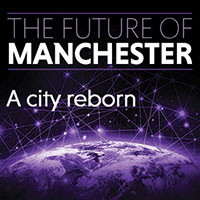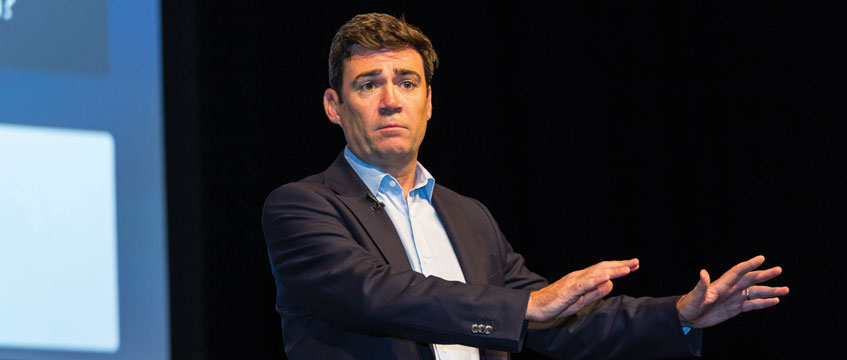Rebuilding communities and careers after Covid-19 will take hard work and new thinking – and Greater Manchester mayor Andy Burnham wants the real estate industry to play its part.
The coronavirus pandemic has taught communities and companies a lot. One lesson is that the traditional way of doing things is not necessarily the best. The way we live and work will undoubtedly change as a result of the crisis. That means the way the real estate industry approaches the places in which we live and work should change too.
It’s a message that Andy Burnham wants the property industry to hear loud and clear. Not simply as a challenge, but as an invitation to collaborate. The industry has “stepped up” during the crisis, acknowledges the mayor of Greater Manchester, working on Nightingale hospitals, providing parking spaces to NHS workers and opening up hotels to the homeless. As the country looks to recover from the pandemic, property can help to shape communities in a way that reflects the lessons learned – with a little creative thinking.
“I need to say it: the industry needs to challenge itself and become more creative, more innovative, and think about places rather than schemes,” Burnham says. “And then it needs to work with people like myself and [West Midlands mayor] Andy Street to come together with more imaginative, ambitious plans, rather than going to the easier sites for development.”
Burnham is clear about what he wants: “New communities, built for people rather than cars, digitally enabled, zero carbon and connected to high-quality integrated public transport.”
Supporting the city
There’s arguably no better time to focus on change. Manchester, like most cities, is unlikely to be the same once the pandemic passes.
“We won’t see a quick return to normal – whatever normal might be in the future,” Burnham says. “Capacity on public transport and the roads will change the way people work, and the commute will never be the same. I’m not expecting there to be a complete return of office-based city centre employees this year. This will be a gradual process of change.”
That poses big challenges for the city and regional economy. Burnham expects only a quarter of his staff to return to the office initially once government guidance allows, but will tell them “we need to get back to support the city”. “It’s really important that we support the bars, restaurants and leisure outlets,” he adds. “That’s important to the city in the long run.”
I think people crave the physical experience of being in a shop. They crave meetings in an office. People are going to want to come into towns and cities
Transport infrastructure will need to be rethought over time, and Burnham believes “the dominance of the car might be ended by Covid”. A push for greener ways of travelling has long been front of mind for Burnham, who in 2017 appointed Olympic cycling champion Chris Boardman as his cycling and walking commissioner. But Covid, he says, will “accelerate our plans and scale up our ambitions”.
“We have been building for the car for too long – for decades in this country – and that’s got to change because a modern, liveable city can’t base itself around the car,” he adds. “What you will see in Manchester and other cities, I’m sure, is much more pedestrianisation of the core of the city, combined with more planned routes through to commute into the city from the outer boroughs so commuting by bike is a realistic option for people.”
Bringing the industry along
Burnham is no believer in the long-term attractions of isolation. Lockdown has shown us that a life spent staring at a laptop screen has its limitations, he says. That should spur real estate on, he adds.
“I think people crave the physical experience of being in a shop. They crave meetings in an office. People are going to want to come into towns and cities. The issue is they’re going to have to be better-planned, more attractive places to be than perhaps they are. There will have to be some rethinking of that – how can you make these places a destination that people will want to go to?”
That takes teamwork, the mayor says, pointing to the Stockport Mayoral Development Corporation – set up to regenerate Stockport town centre – as the kind of initiative that can bring local stakeholders together.
“As long as we can bring the industry with us, you can see that as an exemplar for regeneration,” he says. “Not the government mandating its own development corporation and bypassing local councils – one that does it bottom-up with really strong support from all the players in the locality. I think Stockport could create a template for how a British town could move from a 20th century situation to a completely new future.”
This is a moment for devolution. Recovery always will be better if it is led bottom-up rather than top-down
Burnham and colleagues across the region will face their own difficulties during the Covid-19 recovery, and the financial hurt caused to councils by the pandemic should not be underestimated. The 10 Greater Manchester districts, Transport for Greater Manchester and the Greater Manchester Combined Authority face a combined budget deficit of £368m, says Burnham – “and it’s not a worst-case scenario, that’s a likely outcome if things stay as they are”.
He calls on government to “shore up the finances of local government”, urging that “councils will be critical in leading the economy”. But he also wants further devolution to remain on the agenda, adding that he and his fellow “M9” mayors had a “positive discussion” with chancellor Rishi Sunak in late June about the government’s forthcoming devolution white paper.
“This is a moment for devolution,” he says. “Recovery always will be better if it is led bottom-up rather than top-down.
“What we need first is more control of the public money already spent in places like Greater Manchester… Let us start to control what’s already there and get rid of the Whitehall silos, and then on top of that bring some extra financial firepower that we might be able to deploy. English cities outside London have been held back, certainly since the Victorian period. We’ve got so much potential.”
People, not infrastructure
Despite Burnham’s belief that placemaking is critical, it isn’t the starting point for change in a post-coronavirus world, he says. Instead, companies and authorities should put people first. And that goes for the government’s goal of “levelling up” the regions as well.
“Levelling up has been code for concrete and steel so far,” he says. “I don’t think you level up places by simply laying new roads or rail. You level up when you give people hope, help and ambition. That has been missed out of the conversation.”
The distinction is particularly true as communities and economies recover from Covid-19, the mayor adds, which poses “a people challenge, not an infrastructure challenge”.
“We’ve got thousands of people on furlough in Greater Manchester who may be about to lose their jobs,” he says. “We’ve got young people who, if they’re left to lose their apprenticeship without something else, will have scars that will take many years to heal. This generation of people, potentially, could be more disrupted than any generation since the wartime period. The message I’m giving to government is that the people challenge this year is absolutely urgent.”
I don’t think you level up places by simply laying new roads or rail. You level up when you give people hope, help and ambition
Burnham wants to see a Young Person’s Guarantee to help people into work, as well as government funding for conversion courses that would make it easier for people to move from struggling lines of work into areas such as green construction.
“Yes, it might be costly, but it will be more costly to let thousands and thousands of people go onto the scrap heap. If we’re not careful, the 2020s in the north of England could be worse than the 1980s, and we have to avoid that.”
If that sounds like a stark warning, that’s exactly how Burnham wants it to be taken. But, as ever, he returns to a note of hope for his region as recovery takes hold. Singling out what real estate can bring to the table, he also has a novel idea for some of the empty offices ahead of a full return to work for the regional workforce.
“The return to the office will be a gradual process – there’s going to be a lot of empty office space around,” he says. “Is there a scheme we could work on to provide free or subsidised start-up space to people who have been thinking over lockdown that they might start their own business? Could the industry convert space to provide hubs we could use to incubate a generation of new businesses? Could the industry be at the heart of a drive to make this a moment of business creation?”
Burnham clearly thinks so. Real estate bosses – over to you.

 Watch EG’s interview with Andy Burnham
Watch EG’s interview with Andy Burnham
Click here to watch Damian Wild, editor-in-chief and publisher of EG, interview Andy Burnham at EG’s Future of Manchester event.
To send feedback, e-mail tim.burke@egi.co.uk or tweet @_tim_burke or @estatesgazette











